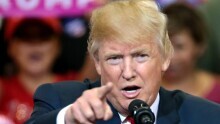America’s access to global talent has helped it stay ahead of China in the AI arms race. But that edge is being blunted by the Trump administration.
Yesterday, the White House sacrificed another chunk of its advantage on the altar of nationalism, when President Trump announced the suspension of certain temporary work visas. Among them was the H-1B program for highly-skilled workers, which used largely by the tech sector.
Trump argued the ban would help the economy recover from the coronavirus pandemic by ensuring that jobs first go to Americans. However, tech leaders were quick to rebuff his claim.
Their objections were personal, political, and commercial. Often, they were a combination of all three.
Box founder Aaron Levie said the move would “only mean more jobs move outside the US,” while Elon Musk tweeted that the visa-holders “are net job creators.”
Further criticism came from Hugging Face CEO Clément Delangue and Coursera cofounder Andrew Ng. They noted that Trump had suspended the visa program that had allowed them to launch their businesses in the US.
Trump just suspended the visa program that allowed me to move to the US to start @huggingface! Unfortunately, I won’t be able to vote in a few months but if you can, please vote him out, he's destroying what made America great in so many different ways! https://t.co/Y46hpawXdb
— clementdelangue (@ClementDelangue) June 22, 2020
The duo is part of an enormous pool of tech talent that was born overseas. Research from Georgetown University suggests that more than 20% of computer scientists with graduate degrees employed in the US were born abroad. It also found that the majority want to stay in the country. However, that desire may now be diminishing.
Twisting the AI talent tap
The AI industry will be hit particularly hard by the ban. As tech researcher Zachary Arnold observed last year, immigrants comprise two-thirds of US graduate students in AI, and have founded many of the country’s most prominent firms in the field, including Google, Tesla, and Nvidia. Closing the door on this talent could also deepen the biases of AI systems.
The US education system still can’t produce enough AI talent to fill the expanding field. This helps explain why the Partnership on AI has recommended the creation of a dedicated visa category for AI experts.
Many of those experts now come from China. The Global AI Talent Tracker found that 29% of researchers with papers accepted at the 2019 NeurIPS AI conference had received undergraduate degrees in China — more than any other country. It added that the majority of them (56%) go on to study, work, and live in the United States.
[Read: China’s about to overtake the US as the world’s best performing tech industry]
“Sacrificing international students is killing the goose that lays the golden egg,” Lisa Li, a Chinese engineer who recently graduated from Johns Hopkins University, told The New York Times earlier this month. “It will eventually destroy the future competitiveness of America.”
The new restrictions have also made a big splash in India, the home country of two-thirds of H-1B visa applicants and numerous tech luminaries, including Google CEO Sundar Pichai and Microsoft boss Satya Nadella.
Indeed, some Indian observers have argued that the US talent magnet is a brain drain on their domestic IT sector.
The greatest trick Indian IT Services companies ever pulled was convincing India that losing talented people to the US was a good thing. https://t.co/L4TGOhYDJc
— Rohin Dharmakumar (@r0h1n) June 23, 2020
Those reactions should serve as a warning to the US. As Box CEO Levie put it:
When you restrict immigration, the jobs still get created, just somewhere else. And later down the road, when those individuals create the next Google, it won’t be here.
Revision over abolition
The H1-B visa was originally created in 1990 to fill temporary labor shortages. But it soon became a fixture at rapidly expanding tech firms searching for more talent. Around three-quarters of the 85,000 H-1B visas issued each financial year currently go to people working in the sector.
Critics argue that the visas allow tech firms to outsource American jobs to lower-paid foreign employees. But research by the National Foundation for American Policy suggests that H-1B visa holders do not adversely affect US workers.
One argument against the system that holds more weight is that it extends the dominance of Silicon Valley giants over their smaller competitors. As the Partnership on AI explains:
While multinational companies and well-funded universities are able to hire visa experts, resource constrained startups, students, and less affluent applicants lack the finances to successfully obtain visas.
However, that problem could be resolved by reforming the visa process to make it easier for applicants with limited resources to hire international talent. But the Trump administration has chosen to make it harder.
The new rules could still invite legal challenges from opponents. If they fail, international AI talent will lose another chance to succeed in the land of opportunity.
Get the TNW newsletter
Get the most important tech news in your inbox each week.





